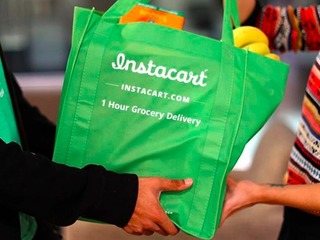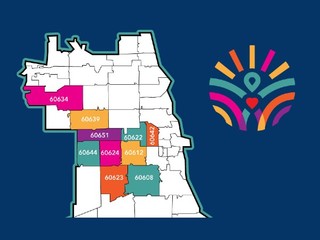Oxford Cancer Analytics raises $11M to detect lung cancer via a blood test
OXcan combines proteomics and artificial intelligence for early detection
Read more... In 2022, almost 13% of households across the United States were considered food insecure, meaning they lacked access to affordable, nutritious food, a problem that has been associated with increased risk for diabetes, obesity, heart disease, and mental health disorders.
In 2022, almost 13% of households across the United States were considered food insecure, meaning they lacked access to affordable, nutritious food, a problem that has been associated with increased risk for diabetes, obesity, heart disease, and mental health disorders.
Since late 2022, when grocery delivery company Instacart debuted Instacart Health, the company has entered into a number of partnerships to help promote nutrition and food access, including with Wellness West, Partnership for a Healthier America, the Biden administration, and, most recently, Dispatch Health.
On Wednesday, it announced ts latest partnership, this time with Pack Health, a company that specializes in patient engagement, to integrate Instacart into Pack Health’s programs.
Through this collaboration, Instacart, food insecure members enrolled in a Pack Health engagement program may receive same-day delivery of nutritious food designed to suit a member’s condition from local grocers through their health plan. Meanwhile, Pack Health will provide them with weekly one-to-one coaching services, shopping lists and recipes, and dedicated support to help members mitigate the impacts of social determinants of health (SDOH).
Founded in 2013, Pack Health, which was acquired by Quest Diagnostic in 2022, matches members with one of the company’s in-house Health Advisors to guide them through condition-specific modules over a 12-week period. Members engage with Pack Health through a weekly phone call, two-way texts, and emails. Health Advisors are trained across over 20 chronic conditions to engage, motivate, monitor and support members, providing personalized content.
To support its programs, Pack Health will leverage Instacart Health's Fresh Funds program, which allows organizations to provide funds for people to buy nutritious food from grocery retailers on the Instacart App.
The company will also provide category-specific grocery stipends, as well as tools that help members act on nutrition advice from Pack Health Advisors, including Lists for Nutrition, which can be tailored to a member’s unique dietary preferences and needs, as well as Shoppable Recipes to support meal planning.
Pack Health first piloted a similar program that combined fresh grocery delivery with coaching services to a group of over 500 participants in the Southeast in 2023. In addition to improving the participating members’ physical and mental health. As a result, it was able to reduce food insecurity from 42% to 19%.
“We believe combining grocery delivery with nutrition coaching services can uniquely drive the adoption of healthy habits while teaching long term, sustainable behaviors to our members,” Robert Ginter, Vice President and General Manager of Pack Health, said in a statement.
“This relationship with Instacart will help food insecure individuals who are already managing their health through our coaching services change their lives for the better. We know that combining coaching services and access to fresh grocery delivery can be effective, and are excited by this opportunity to reach more people across the country who remain in need of this service.”
Other initiatives in the Instacart Health program include Care Carts, which are designed to give healthcare providers and caregivers the ability to order groceries on behalf of someone else; for example, a clinician might want to deliver groceries for a patient’s prescribed meal plan.
The company also launched Health Tags, which let customers view up to 23 item-level labels, including low-salt, low-sugar, keto, gluten-free, while they shop on Instacart.
Instacart also unveiled its Instacart Health Policy Agenda, which outlines the company’s top three policy priorities and new advocacy commitments to help expand access to nutritious food and improve health outcomes. That will involve working with policymakers, researchers, nonprofit leaders, private sector partners, and others to help shape and enact policies at the federal, state, and local level with the aim of modernizing food assistance programs to increase equitable access to nutritious food; increasing the availability of affordable, nutritious food in underserved urban and rural areas; and providing equitable access to health-tailored groceries and food prescription programs.
In addition, the company also partnered with the Biden administration on the White House Challenge to End Hunger and Build Healthy Communities, while also partnering with Boston Children’s Hospital.
“Nutrition and health are deeply intertwined, and we believe there is an enormous opportunity to integrate food into healthcare to improve outcomes,” said Sarah Mastrorocco, Vice President and General Manager of Instacart Health, in a statement.
“Our mission is to give people access to nutritious food, and through Instacart Health, we’re dedicated to ensuring families not only have access, but also the resources and support needed to lead healthier lives. Through our collaborations, we’re offering user-friendly solutions that leverage Instacart’s reach, scale, selection and technology to address social determinants of health and make nutrition guidance from experts like Pack Health actionable.”
(Image source: ytimg.com)
OXcan combines proteomics and artificial intelligence for early detection
Read more...Nearly $265B in claims are denied every year because of the way they're coded
Read more...Most expect to see revenue rise, while also embracing technologies like generative AI
Read more...


